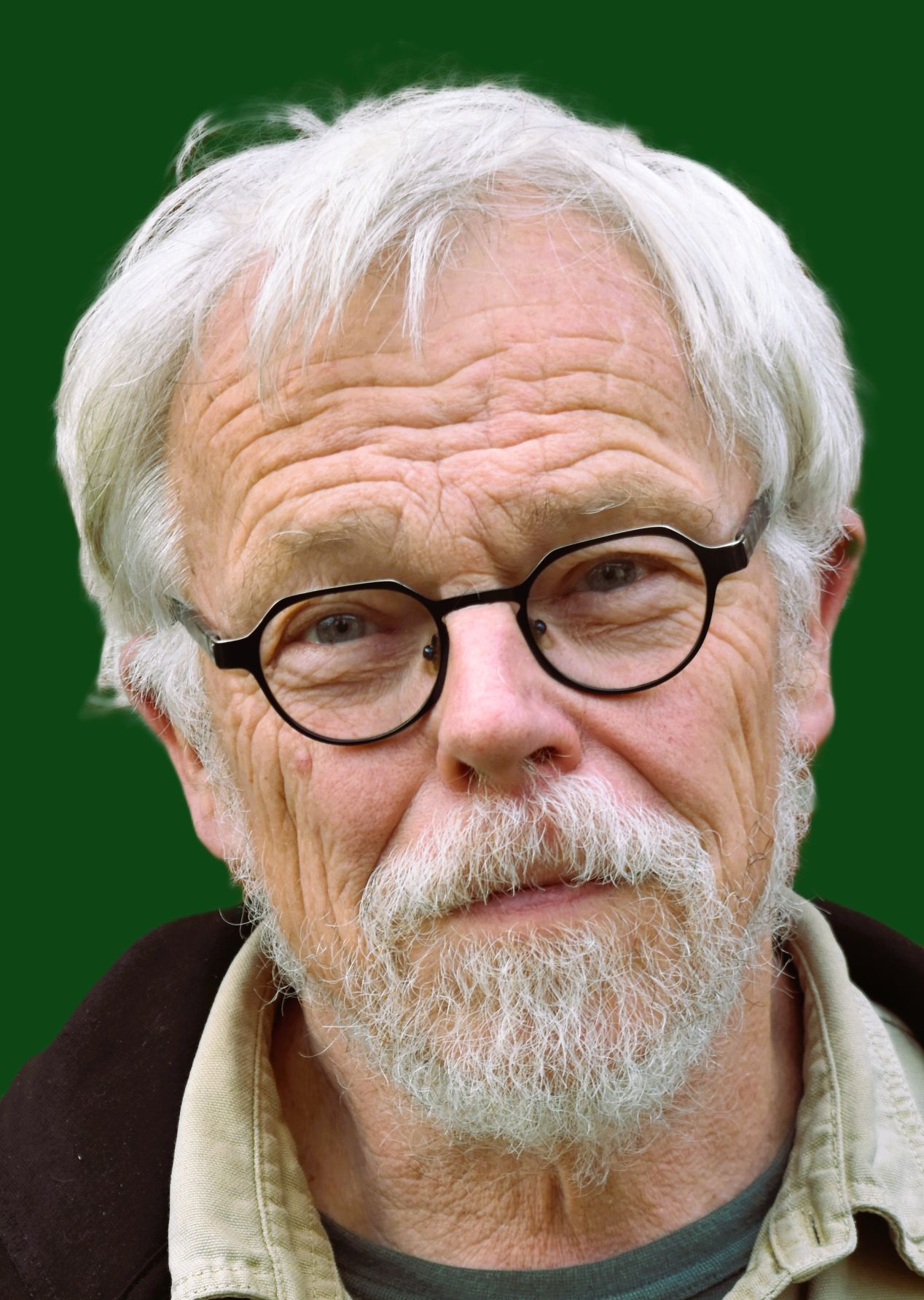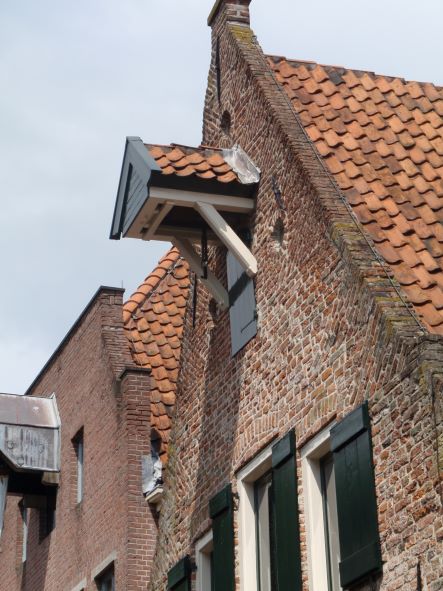Hello, this is Johan van Rhijn's homepage,
biologist, crofter and author.
biologist, crofter and author.
 Nederlands
News
Activities
Publications
Nederlands
News
Activities
Publications

No, the picture (and in the background) is not of my home. The house is situated in Deventer, The Netherlands, in the Noordenbergstraat. I was born in that town, but the picture was chosen for another reason: because of the ingeneous constructon on the facade of this house: a roofed lifting bar. I used it as a metaphor for ecological carrying capacity. That's under great pressure, because humans consume more than nature is able to produce. That's far from sustainable.
Environment
In 2010, less than two years after my retirement, I published the book 'Hoe rekbaar is onze planeet?' (How extensible is our planet?), primarily for my former colleagues and students, on ecological carrying capacity. Since the end of 2020 I am trying to discover why governments are almost unable to develop long-time-strategies to reduce environmental problems, such as loss of biodiversity and climatic change. Surely, this would imply that human consumption should be limited. That's an unpleasant message for many people and thus it is tricky for a politician to bring this message. The book about this investigation (written in Dutch) 'Het Milieu en de Macht - Waarom we niet voor morgen zorgen' (The Environment and political power - why we do not care for tomorrow) was launched on 24 February 2023.
Internet
Quite a number of other things may go wrong. Around 1970 it was the first time I needed a computer for analysing my data of my research in behavioural biology. The machine was based at the coputer centre of the university. Around 1975 our lab got its first computer. I learned how to operate it, also to write simple programs, and a few years later I got my own PC. In 1990 the universities in the Netherlands became connected to the fledgeling internet and in 1995 I had my connection at home. One could not use the internet for many tasks by that time. Yes, for sending and receiving e-mails and for visiting websites if you knew the website address. There were search engines, but slow, incomplete and not up-to-date, and the social media did not yet exist. Since then the developments were turbulent with (for now) AI as a 'highlight'.
I used the internet in quite a number of ways (and took great advantage of it), but gradually I began to realise that the developtments get out of our control. Should we consider to shut down the internet? Only that question faces us with many dilemmas. Is it necessary? Is it possible? How? I tried (mainly fo myself) to bring some structure in these questions in an essay 'Internet opdoeken?' (written in Dutch).
Johan van Rhijn (1943) is a biologist, not a professional historian, information technologist, politician or an expert in public administration, but a person who is willing to discover the broader context of events, prepared to extract his knowledge from various sources, and as many as possible. During about 20 years he was doing research in animal behaviour at the University of Groningen, and subsequently, again for about 20 years, he was teaching, writing courses and tutoring students at the Open Univertsity of the Netherlands (where he became the first 'teacher of the year' in 2007). Besides a number of scientific papers, he published several textbooks, a monography (in English) on a remarkable species of birds ('The Ruff') and six books (in Dutch) for a general audience.
e-mail adress:
johan-van-rhijn@wxs.nl
Environment
In 2010, less than two years after my retirement, I published the book 'Hoe rekbaar is onze planeet?' (How extensible is our planet?), primarily for my former colleagues and students, on ecological carrying capacity. Since the end of 2020 I am trying to discover why governments are almost unable to develop long-time-strategies to reduce environmental problems, such as loss of biodiversity and climatic change. Surely, this would imply that human consumption should be limited. That's an unpleasant message for many people and thus it is tricky for a politician to bring this message. The book about this investigation (written in Dutch) 'Het Milieu en de Macht - Waarom we niet voor morgen zorgen' (The Environment and political power - why we do not care for tomorrow) was launched on 24 February 2023.
Internet
Quite a number of other things may go wrong. Around 1970 it was the first time I needed a computer for analysing my data of my research in behavioural biology. The machine was based at the coputer centre of the university. Around 1975 our lab got its first computer. I learned how to operate it, also to write simple programs, and a few years later I got my own PC. In 1990 the universities in the Netherlands became connected to the fledgeling internet and in 1995 I had my connection at home. One could not use the internet for many tasks by that time. Yes, for sending and receiving e-mails and for visiting websites if you knew the website address. There were search engines, but slow, incomplete and not up-to-date, and the social media did not yet exist. Since then the developments were turbulent with (for now) AI as a 'highlight'.
I used the internet in quite a number of ways (and took great advantage of it), but gradually I began to realise that the developtments get out of our control. Should we consider to shut down the internet? Only that question faces us with many dilemmas. Is it necessary? Is it possible? How? I tried (mainly fo myself) to bring some structure in these questions in an essay 'Internet opdoeken?' (written in Dutch).
Johan van Rhijn (1943) is a biologist, not a professional historian, information technologist, politician or an expert in public administration, but a person who is willing to discover the broader context of events, prepared to extract his knowledge from various sources, and as many as possible. During about 20 years he was doing research in animal behaviour at the University of Groningen, and subsequently, again for about 20 years, he was teaching, writing courses and tutoring students at the Open Univertsity of the Netherlands (where he became the first 'teacher of the year' in 2007). Besides a number of scientific papers, he published several textbooks, a monography (in English) on a remarkable species of birds ('The Ruff') and six books (in Dutch) for a general audience.
e-mail adress:
johan-van-rhijn@wxs.nl